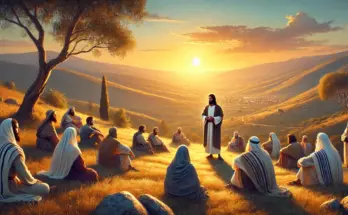The Parable of the Tenants
33 Hear another parable: There was a certain householder, which planted a vineyard, and hedged it round about, and digged a winepress in it, and built a tower, and let it out to husbandmen, and went into a far country: 34 And when the time of the fruit drew near, he sent his servants to the husbandmen, that they might receive the fruits of it. 35 And the husbandmen took his servants, and beat one, and killed another, and stoned another. 36 Again, he sent other servants more than the first: and they did unto them likewise. 37 But last of all he sent unto them his son, saying, They will reverence my son. 38 But when the husbandmen saw the son, they said among themselves, This is the heir; come, let us kill him, and let us seize on his inheritance. 39 And they caught him, and cast him out of the vineyard, and slew him. 40 When the lord therefore of the vineyard cometh, what will he do unto those husbandmen? 41 They say unto him, He will miserably destroy those wicked men, and will let out his vineyard unto other husbandmen, which shall render him the fruits in their seasons.
Matthew 21:33-41
42 Jesus saith unto them, Did ye never read in the scriptures,The stone which the builders rejected, the same is become the head of the corner: this is the Lord’s doing, and it is marvellous in our eyes?
Matthew 21:42
43 Therefore say I unto you, The kingdom of God shall be taken from you, and given to a nation bringing forth the fruits thereof.44 And whosoever shall fall on this stone shall be broken: but on whomsoever it shall fall, it will grind him to powder.
Matthew 21:43
45 And when the chief priests and Pharisees had heard his parables, they perceived that he spake of them. 46 But when they sought to lay hands on him, they feared the multitude, because they took him for a prophet.
Matthew 21: 45-46
The Landowner
In the parable of the tenants, Jesus tells a story about a landowner who plants a vineyard, builds a fence around it, digs a winepress, and builds a watchtower. Afterward, the landowner leases the vineyard to some tenants and goes away. When the harvest time comes, the landowner sends his servants to collect the produce, but the tenants mistreat and kill them. The landowner then sends more servants, but they suffer the same fate. Finally, the landowner decides to send his own son, thinking the tenants will respect him. However, the tenants see the son as an opportunity to seize the vineyard for themselves. They throw him out of the vineyard and kill him. The parable ends with Jesus asking the listeners what the landowner will do to those wicked tenants.
Interpreting this parable, we can understand the landowner as representing God, the vineyard as representing Israel, and the tenants as representing the religious leaders and people of Israel. The servants sent by the landowner symbolize the prophets sent by God to guide and call the people of Israel back to Him. These prophets were often rejected, mistreated, and even killed by the people.
When the landowner sends his son, it represents God sending His own Son, Jesus Christ, to the world. However, Jesus foretells His own rejection, suffering, and death at the hands of the religious leaders and people. The parable highlights the rejection of God’s messengers throughout history and ultimately the rejection of His Son, Jesus.
By posing the question about the landowner’s response, Jesus prompts the listeners to consider the consequences of the tenants’ actions. The listeners respond that the landowner will bring those wicked tenants to a miserable end and lease the vineyard to others who will give him the fruits in their season. Jesus affirms their response, indicating that the religious leaders and those who reject Him will be replaced by others who will bear spiritual fruit and fulfill God‘s purposes.
This parable carries a strong message about the responsibility of God‘s chosen people, Israel, to respond faithfully to God’s call and to recognize and accept the Messiah when He comes. It also serves as a warning to the religious leaders of the time who were rejecting Jesus’ teachings and ultimately played a role in His crucifixion. The parable conveys the consequences of rejecting God’s messengers and the Son Himself, emphasizing the need for repentance and faithfulness.
Further Study
Parables: The Mysteries of God’s Kingdom Revealed Through the Stories Jesus Told by John F. MacArthur. MacArthur provides a comprehensive analysis of various parables, including the Parable of the Tenants, exploring their cultural context, theological significance, and practical applications.
Interpreting the Parables by Craig L. Blomberg. Blomberg’s book offers a scholarly yet accessible exploration of Jesus’ parables, providing historical background, interpretations, and discussions on their relevance for contemporary readers.
The Parables of Jesus by Joachim Jeremias. Jeremias, a renowned biblical scholar, delves into the historical and cultural context of Jesus’ parables, including the Parable of the Tenants, shedding light on their original meanings and implications.
These resources offer various perspectives, historical contexts, and interpretations of Jesus’ parables, providing valuable insights into the Parable of the Tenants and its significance within the broader teachings of Jesus.
Click here to print or download the scripture study “The Parable of the Tenants“




